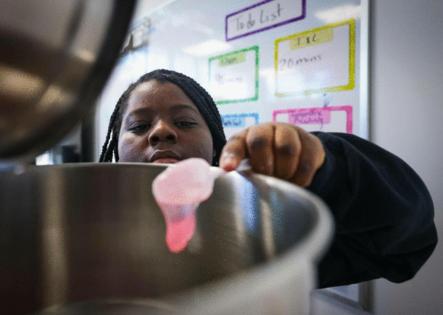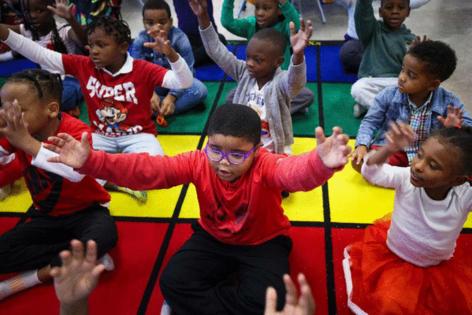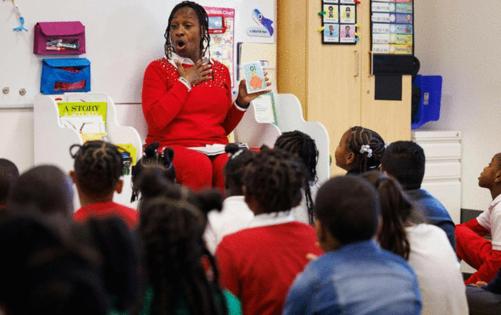'Microschools' are popping up across Miami. The latest to open already has a waitlist
Published in News & Features
MIAMI — As teacher Monique Bridges worked on her computer in her Liberty City classroom on a recent morning, students quietly wore headphones as they worked on different projects.
In the back of Bridges’ classroom, sixth graders Albrielle Jones and Octruiya Howell stood at a small table. Jones used a large machine to create tubes of lipgloss that she hoped to sell at a farmer’s market. Next to her, Howell baked cake pops that she wanted to sell from a food truck.
“I enjoy making things and mixing things together,” said Albrielle, 12.
“Whatever their passion is, I try to make it rigorous for them,” Bridges said.
Their Liberty City school is the latest to open in South Florida under the for-profit chain Primer, which operates so-called “microschools” in Florida, Alabama and Arizona. Teachers say the smaller classroom sizes allow them to better focus on the needs of individual students and give those students time to work on passion projects outside of the regular curriculum. The company’s CEO, Ryan Delk, believes small classes like Bridges’ provide an advantage for students to build close bonds with classmates that can only help them succeed.
“There’s plenty of people for them to go with, but there’s not enough for bullying, cliques and all of this other stuff to start to pop up,” he said. “Our schools don’t deal with a lot of the issues that a traditional system does.”
Primer’s Liberty City campus, which opened in November, serves 120 students across five mixed-age class groups. Currently, there are Primer schools in Coconut Grove, Liberty City, Kendall, Miami Shores, Overtown and Fort Lauderdale, with locations planned for Cutler Bay, Doral, Homestead, Miami Gardens and Plantation.
Many students who attend Primer are eligible for state funding vouchers that cover the costs of attendance. In other cases, parents can opt to be student ambassadors, where their services rendered can be used to cover their child’s tuition fees. “Making it accessible to families, especially middle-class families, is really important to us,” Delk said. Primer offers rolling admissions, though parents are encouraged to apply as early as possible because many campuses have waitlists.
Sherry Jones is Primer Liberty City’s campus coordinator, an administrator who helps with day-to-day tasks. She has seen her daughter Albrielle’s rapid growth at the school. As a Liberty City native, she believes in the way the school supports students’ goals and also participates as a school ambassador.
“The experience has been great. She used to struggle in literacy but now she is flourishing,” Jones said of her daughter. “Since she’s been here, she’s been able to launch her lip gloss business.”
Apryl Shackelford runs the school as its “leader,” a role that a traditional school would call principal, although she continues to teach in the classroom as well. She began her education career in 2007 in Jacksonville and eventually became Duval County’s teacher of the year in 2013.
Shackelford said her experience of working with marginalized students in another part of Florida has informed the way she works to empower students in Liberty City.
“Kids can learn in Liberty City, and great things come out of Liberty City,” she said.
She also appreciates how the Primer business model pays teachers well so that they can afford to live in Miami and focus on their work. Teachers earn 40% more than their counterparts in public schools, according to Delk.
“Teachers are leaving the profession because they are not getting what they’re worth and they’re just getting more and more tasks on them,” Shackelford said. “It’s beyond important just to pay people what they’re worth.”
Looking ahead, Shackelford is eager for the Primer system to gain momentum. The waitlist for the Liberty City campus is at about 80 students, and there are plans to continue to expand the system throughout Florida.
Delk said he was inspired to launch Primer because his mother started one of the first microschools in Florida in 1996. As a child, Delk’s family moved into his grandparents’ house in a very low-income neighborhood. Rather than attend the low-rated school that he was zoned for, Delk’s mother, a schoolteacher, decided to teach him, his siblings and other kids in their neighborhood. She continued to do that for the next 16 years before he attended the University of Florida.
“When my wife and I started having kids and started thinking about education, it was clear that there was still a big gap because I had this amazing experience, but it was still way too hard for other families to get that experience,” he said. “Primer is really helping other teachers help create that experience for kids in their community.”
©2024 Miami Herald. Visit at miamiherald.com. Distributed by Tribune Content Agency, LLC.












Comments